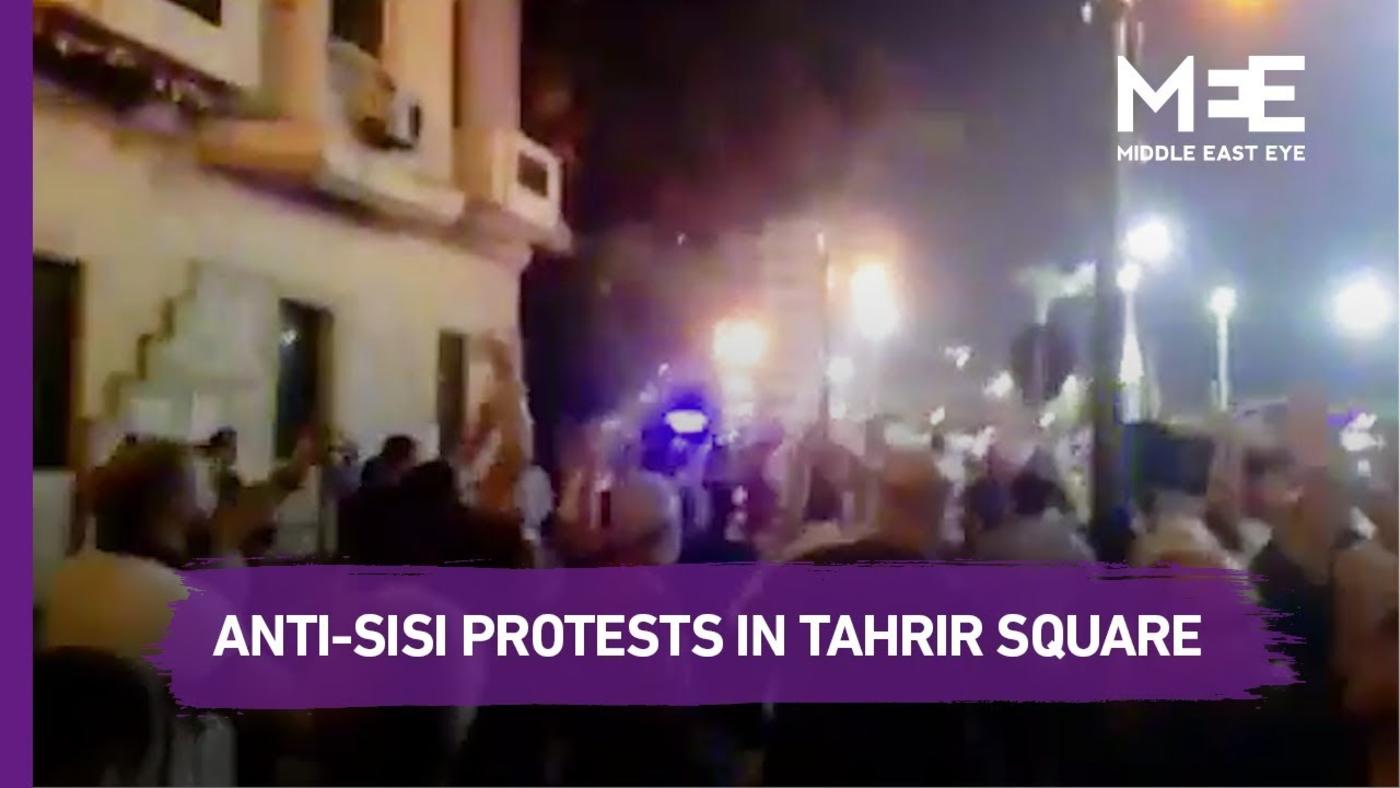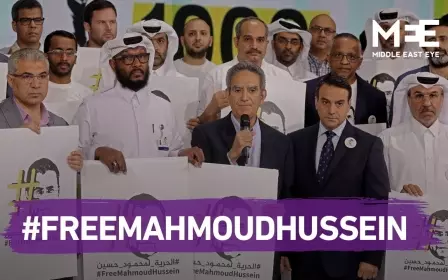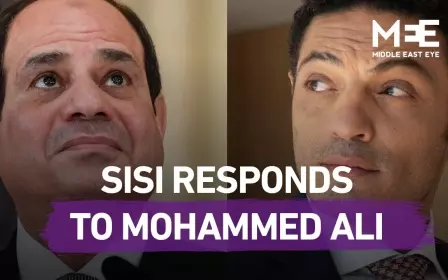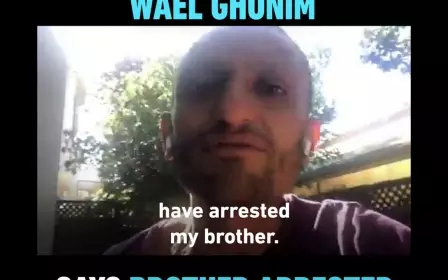Protests break out against Sisi in Tahrir Square and across Egypt
Egyptian activists have held protests against the government of President Abdel Fattah el-Sisi in the largest demonstrations since the former army general tightened his grip on the country.
Crowds gathered in Cairo's Tahrir Square, the site of the 2011 uprising that toppled longtime autocrat Hosni Mubarak, on Friday night and early on Saturday, calling for an end to Sisi's rule.
"The people want to topple the regime," shouted demonstrators in Tahrir Square, according to a video posted on Twitter, echoing the chants of the 2011 Arab Spring uprisings across the Middle East and North Africa.
Footage showing anti-Sisi demonstrations in other cities including Alexandria, Suez, Gharbiya and Mahala, Mansoura and Damietta, continued to surface online into the early hours of Saturday.
New MEE newsletter: Jerusalem Dispatch
Sign up to get the latest insights and analysis on Israel-Palestine, alongside Turkey Unpacked and other MEE newsletters
But the protesters have faced violence and a wave of arrests, according to a Middle East Eye correspondent in Cairo, who described seeing a group of about 200 protesters heading for Tahrir Square dispersed by riot police late on Friday.
"No deaths, but I saw about 20-25 people arrested and held in police trucks. Some were released later. Currently downtown is full of riot police and plain-clothes policemen," said the correspondent, who remained anonymous because of the restrictions on journalists in the country.
Protesters had taken to side streets, gathering in small groups chanting "leave" and "down down with Sisi Mubarak".
Tear gas was used to disperse demonstrators near Tahrir, and dozens have been arrested. Videos posted on social media showed security forces chasing down protesters in Cairo in riot vans, and there were reports of security forces using violent tactics against protesters elsewhere in the country.
Most downtown shops that normally stay open late Friday were closed.
The protests began in the virtual space, as anti-Sisi hashtags had been trending for weeks on social media amid increasing frustration with economic conditions and lack of freedoms in the North African country.
By the early hours of Saturday morning in Egypt, the hashtag #ميدان_التحرير (#Tahrir Square) was among most popular trends worldwide on Twitter.
Friday's protests came after Egyptian actor and real estate developer Mohamed Ali had posted videos ostensibly depicting acts of corruption by Sisi and the Egyptian ruling class.
Egypt's war of hashtags: Mohamed Ali's social media campaigns
+ Show - HideFollowing Mohamed Ali’s videos, a number of hashtags have gone viral, calling on the Egyptian president to step down.
In a video posted on 15 September, Ali called on Egyptians to use the hashtag #كفايه_بقى_ياسيسى (That’s enough Sisi) which was trending at number one in Egypt and at number six worldwide.
Since then, the hashtags #ارحل (step down) الشعب_يريد_إسقاط_النظام
The videos and trending hashtags have sparked a counter hashtag, #احنا معك يا سيسي (We are with you Sisi) from government supporters. The hashtags have been a key part of sparking debate about the current conditions in Egypt, with people using them to discuss living conditions and socio-economic problems.
The 43-year-old Egyptian whistleblower has released more than a dozen videos from self-exile in Spain, alleging that officials misappropriated millions in public funds for their personal projects.
Ali said that, over the past 15 years, as the owner of a property company that contracted with the Egyptian military on major construction projects, he has had a front-row seat for all of it, and he's speaking out now because he hasn't been paid.
It was Ali who called for the protest on Friday after a football super cup match between Al Ahly and Zamalek.
In a video posted in the early hours of Saturday, Ali called on Egypt's Defence Minister Mohamed Zaki to remove Sisi.
"You see how the Egyptian people are doing. I hope no escalation happens. Please, your honour, issue an order to arrest Mr. Abdel Fattah el-Sisi... I hope that you side with the Egyptian people," Ali said, addressing Zaki.
"We must all stand together and forget any [disagreements] between us. He must be punished."
Ali told Zaki that the army is tasked with the protection of the Egyptian people, not an individual, no matter how important he is - referring to Sisi.
Ali saluted the protesters, saying Friday's demonstrations helped relieve his pain of the past eight years.
"I'm happy. May God help you succeed. Patriots and brave - this is the Egyptian people," he said.
Reports of mismanagement of public funds and extravagant presidential palaces struck a chord with many Egyptians, who have been suffering economically under Sisi's austerity measures.
"Now you can see families and friends who rarely discussed politics or who had very different opinions agreeing on [Ali's] statements," Noura, a retired journalist who wished to be identified only by her first name because of political conditions in Egypt, told Middle East Eye earlier this week.
Noura said she will participate in the protests that Ali has encouraged: "We should not be afraid of the regime, and people should come together to express their discontent."
'Pretty big'
Khaled Elgindy, a fellow at the Center for Middle East Policy at the Brookings Institution in Washington DC, said he was hesitant to assess the situation in Egypt based on the social media posts of the protests.
Still, he said the eruption of demonstrations - even if they are small - in several cities under such an autocratic government that has a "zero tolerance" policy against dissent shows the growing frustration of Egyptians.
"We know social media people have a tendency to get ahead of themselves, but the fact that even a small number would show up to protest in multiple locations in Egypt, I think, is pretty big, given how repressive this regime has been," Elgindy told MEE.
On Friday, Sarah Leah Whitson, Middle East director at Human Rights Watch, also said the fact that the protesters are risking their lives to demonstrate against their government is a sign of the dire situation in Egypt.
The US-based rights organisation also said that thousands of people had demonstrated across the country and it called on the Egyptian authorities to respect the right to peaceful protest.
"President al-Sisi’s security agencies have time and again used brutal force to crush peaceful protests,” said Michael Page, deputy Middle East and North Africa director at Human Rights Watch, in a statement on Saturday. "The authorities should recognise that the world is watching and take all necessary steps to avoid a repetition of past atrocities."
The protests erupted as Sisi was due to head to New York for the UN General Assembly. Egypt Today reported on Saturday that he had arrived in New York, where he is due to address the General Assembly on Wednesday.
"Hey [Donald Trump], your favorite dictator is on his way to NYC, keep him there, Egyptians don't want him back," pro-democracy activist Iyad el-Baghdadi wrote on Twitter.
Many social media users changed their profile photos to plain red on Friday in solidarity with Egypt's protesters.
Sisi came to power in a 2013 coup that ousted democratically elected former president Mohamed Morsi. Since then, he has snuffed out all forms of opposition and jailed as many as 60,000 dissidents, with many facing death sentences.
Sisi also blacklisted Morsi's Muslim Brotherhood as a terrorist group. Morsi himself was held in prison in conditions which campaigners said had contributed to his death of an apparent heart attack following a court hearing in June
Early in Sisi's reign, he showed that he would not tolerate protests, when Egyptian forces killed hundreds of anti-coup protesters in Cairo in 2013.
Middle East Eye delivers independent and unrivalled coverage and analysis of the Middle East, North Africa and beyond. To learn more about republishing this content and the associated fees, please fill out this form. More about MEE can be found here.






